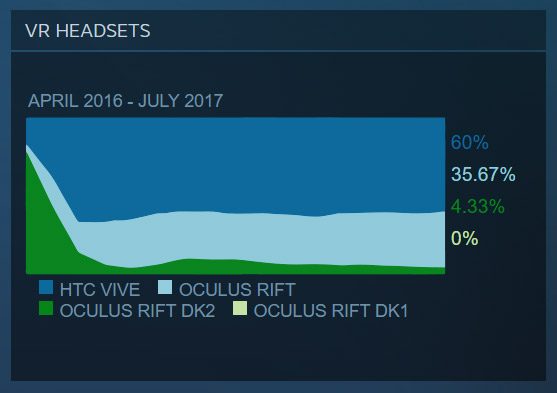According to the latest figures from Valve’s Hardware & Software survey, Rift has reached its highest historical market share on Steam thanks to modest gains amid an ongoing sale. Despite the new high point, the HTC Vive still holds the majority share.
Steam is the defacto content platform for the HTC Vive, though it technically supports the Rift too; plenty of Rifters use both the official Oculus Home platform and Steam to play content which may not be available on the opposing platform.
Each month, Valve runs a survey among Steam users to determine some baseline statistics about what kind of hardware and software is used by the user population, and to see how things are changing over time; that includes which VR headsets are connected to users’ computers.
The latest results show a modest gain of 1.1% in the Rift’s share of VR headset users on Steam, bringing the headset’s overall share to a new high point of 35.7% of all headsets in use on the platform.


Exactly how many Rift users use Steam among the total population of Rift users is unknown, making it largely futile to extrapolate the data in an effort to determine headset market share across all platforms. However, many analyst estimates put the Vive ahead of the Rift in total sales.
The 1.1% gain, the largest on Steam for the Rift in the last four months, is likely driven in large part by the ‘Summer of Rift’ sale which has reduced the price of the Rift & Touch controllers together from $600 to $400. When the sale ends in mid August, the non-sale price for a new all-in-one Rift & Touch bundle will be $500.
Oculus also recently launched several major VR titles exclusive to their content platform—including The Mage’s Tale and Lone Echo—though it isn’t clear if such launches would have a positive impact on Rift’s share of VR headsets on Steam (by driving headset sales), or a negative impact (by reducing the need for customers to look for content outside of the official Oculus platform).
Meanwhile, the HTC Vive (which includes VR controllers by default) retains its original MSRP of $800. The company recently explained why they haven’t yet felt the need to lower the price of the system.

